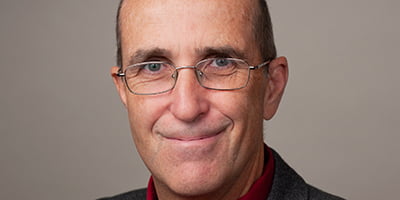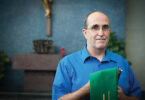
Leon Suprenant is the pastoral associate for administration in the office of the permanent diaconate. He also blogs at: www.archkck.org/blog.
by Leon Suprenant
I remember talking with a graduate student who shared with me that for quite some time he considered the priesthood.
But then he said, “After much prayer and discernment, I came to the conclusion that I didn’t have a vocation. So I got married and started a family.”
We know what this student meant. When we say “vocation,” we’re usually referring to specific callings to the ordained priesthood or consecrated religious life.
Yet, as much as we esteem priests and religious Brothers and Sisters, they’re not the only ones with a “vocation” in the church.
“Vocation” comes from the Latin verb “vocare,” which means “to call.” Through the sacraments of initiation, all Christians without exception are called to holiness and to participation in the church’s outreach to the world. All of us, then, have a vocation!
Many, for example, are called to the beautiful vocation of Christian marriage.
But what about the diaconate?
Some men — single and married — receive the more specific call to the diaconate, through which they’re ordained for Christian service.
But how do I know if God is calling me to the diaconate? The gradual discovery of a vocation to the diaconate, as is the case with any vocation in the church, takes place through prayer and discernment.
A vocation traces its beginnings to one’s ongoing dialogue with God. On the personal level, men considering the diaconate ask the Holy Spirit to reveal the Father’s will for them, not only through times of personal and liturgical prayer, but also in and through daily lives given over to God and neighbor.
As the overwhelming majority of applicants to the diaconate are married, discernment must involve one’s spouse and immediate family. How well do they understand the diaconate and its impact on family life? What are their concerns? How would the diaconate affect the couple’s vocation to marriage?
Any vocation to ministry must involve the church. Ultimately, it is the local church, under the leadership of the archbishop, that calls forth men to the diaconate. The discernment of a diaconal vocation is continually tested throughout the formation process.
While every diaconal vocation is unique, there are some common “signs” of such a vocation, including daily prayer, frequent reception of the sacraments, knowledge of the Catholic faith, and love for the church. The most distinctive sign, however, is the “heart of a deacon,” often expressed in service to one’s family, parish, and local community.
The most important thing, however, is to recognize that Christ has a special plan for each one of us. During this Year of Faith, let us redouble our commitment to seek the Lord’s will for our own lives, and to pray that we may respond generously.

